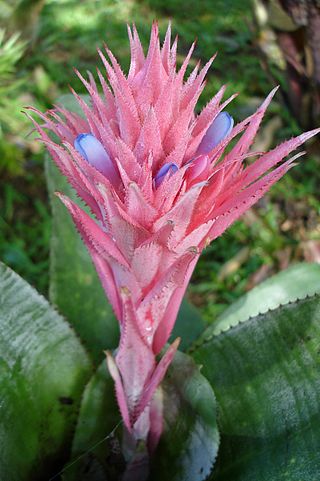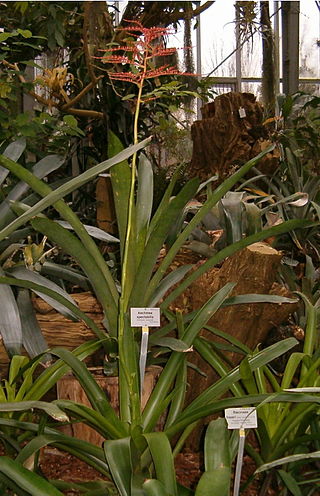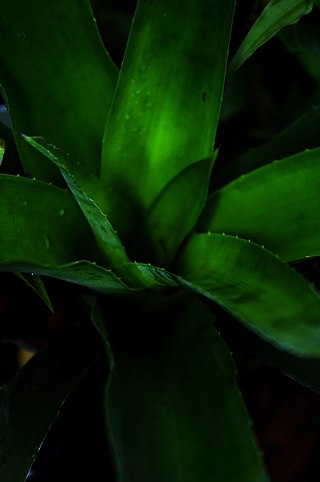
Werauhia is a genus of the botanical family Bromeliaceae, subfamily Tillandsioideae. The genus is named for Werner Rauh, a German botanist (1913–2000). Based on molecular evidence, a number of species previously classified within other bromeliad genera, especially Vriesea and Tillandsia, have been placed in Werauhia instead. Species in this genus are distributed across tropical regions in the Americas.

Vriesea is a genus of flowering plants in the botanical family Bromeliaceae, subfamily Tillandsioideae. The genus name is for Willem Hendrik de Vriese, Dutch botanist, physician (1806–1862). Its species are widespread over Mexico, Central America, South America and the West Indies.

Aechmea is a genus of flowering plants in the family Bromeliaceae. The name comes from the Greek aichme, meaning "spear". Suggested pronunciations include EEK-me-ə and eek-MEE-ə. Aechmea comprises eight subgenera and around 250 species distributed from Mexico through South America and the Caribbean. Most of the species in this genus are epiphytes.

Deuterocohnia is a genus of plants in the family Bromeliaceae, subfamily Pitcairnioideae, endemic to South America. The genus is named for Ferdinand Julius Cohn, Jewish botanist and bacteriologist.

Dyckia is a genus of plants in the family Bromeliaceae, subfamily Pitcairnioideae.

Pitcairnia is a genus of plants in the family Bromeliaceae, subfamily Pitcairnioideae. It was named for William Pitcairn, Scottish physician and gardener (1711–1791). The genus Pitcairnia ranks as the second most prolific of the bromeliad family. They are most abundant in Colombia, Peru and Brazil, but can also be found in areas from Cuba and Mexico south to Argentina. One species, Pitcairnia feliciana, is found in tropical West Africa and is the only member of the family Bromeliaceae not native to the Americas.

Hohenbergia is a genus of plants in the family Bromeliaceae, subfamily Bromelioideae. It is native to the West Indies, the Yucatán Peninsula, and northern South America.

Ronnbergia is a genus in the plant family Bromeliaceae, subfamily Bromelioideae. Native to South and Central America, this genus was named for Auguste Ronnberg, Belgian Director of Agriculture and Horticulture in 1874.

Racinaea is a genus of the flowering plants in the family Bromeliaceae, subfamily Tillandsioideae. The genus is named for Racine Foster, wife of Mulford B. Foster and co-founder of the BSI. It is found in tropical regions of the Americas.

Pitcairnia subg. Pepinia is a subgenus of plants in the family Bromeliaceae. It has at times been treated as the separate genus Pepinia, but is now included again in the genus Pitcairnia. The name is for Pierre Denis Pépin, French member of the Imperial and Central Society of Agriculture (c.1802-1876).

Chevaliera is a subgenus of the genus Aechmea.

Diaphoranthema is a subgenus of the genus Tillandsia.

Tillandsia subg. Phytarrhiza is a subgenus of the genus Tillandsia.

Tillandsia subg. Anoplophytum is a subgenus of the genus Tillandsia.

Tillandsia subg. Tillandsia is a subgenus of the genus Tillandsia.

Tillandsia subg. Aerobia is a subgenus of the genus Tillandsia.

Tillandsia subg. Pseudovriesea is a subgenus of the genus Tillandsia.

Tillandsia subg. Viridantha is a subgenus of the genus Tillandsia.


















